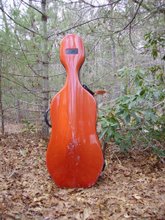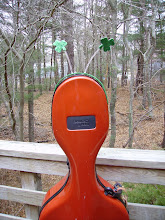Lots of music this week, though little time for practicing. So far, I've been to two early music rehearsals, a flute choir rehearsal, and a fiddle session. Tonight we have a fiddle performance, this time with lobster sandwiches as our payment. Yummy.
The first early music session, on Tuesday night was a little discouraging, as it felt like my week away from practicing had caused me to forget everything I knew about these pieces. Flute choir was different. The week away seemed to improve my playing and my sound. The second early music session seemed to go better, perhaps because we played a little slower. I need to find time to practice some [many] sections
very slowly and work out some fingerings.
Fiddle session went well. A helpful guitar/fiddle/banjo player helped me with some of the accompaniments and called out chords for me. After playing and talking to him, I decided that the best way for me to learn to improvise accompaniments is to memorize some standard accompaniments first. Then, as I get better at hearing chord changes, I can improvise with more certainty. There are lots of sources for written-out accompaniments. The
Music for Three fiddle volume from
Last Resort Music has some cello parts I like and have played with the flute group. We use sheet music in the flute group, but not in the fiddle group, so I know these accompaniments, but haven't memorized them yet. I played their cello part for Coleraine last night with the fiddlers, and it worked fine. The best book for devising fiddle accompaniments, and one I have been meaning to seriously work with, is
Renata Bratt's The Fiddling Cellist. It has lots of great ideas for creating your own accompaniment in various styles. I also have her
Celtic Grooves book/CD, and I just ordered her another of her cello accompaniment books,
Backup Trax, which includes a lot of the tunes my fiddle group plays. I made plans to practice with a fiddle player, to help us both with repertoire, and me with accompaniment.However, I don't just want to accompany. Chops and grooves are not my thing, at least not as a steady diet. I want to play melody or melodic accompaniment.
Abby Newton is my role model here. I love her CDs, and am currently listening to her
Castles, Kirks, & Caves CD of 18th century Scottish music. Beautiful. And perfect for me, combining early music and fiddling. So, in preparation for my Scottish fiddle camp with Abby Newton in August, I am immersing myself in Scottish cello and fiddle music styles so I have a better understanding of it when I get there. I am putting together a list of Scottish cello/fiddle resources, that I will post here soon.












